Russia This Week is a weekly review by the MEMRI Russian Media Studies Project, covering the latest Russia-related news and analysis from media in Russia, the Caucasus, Central Asia, and Eastern Europe.
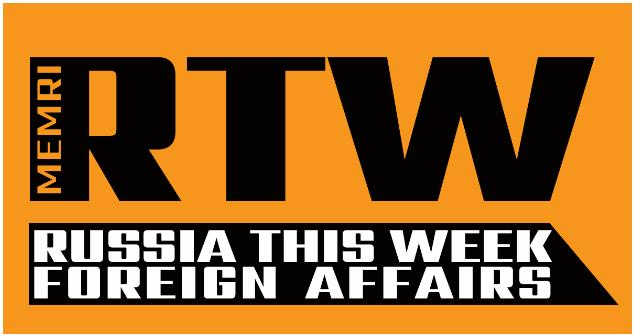
Quotes Of The Week
On August 6, 2017, Russia's Ambassador to the UN Vasily Nebenzya told a UN Security Council session:
"As I have already said, we are working together on resolution of issues important for the international community. This is one of them. We are not hostages to our relations when we need to jointly work on matters that are much more important than our bilateral relations."
(Tass.com, August 6, 2017)
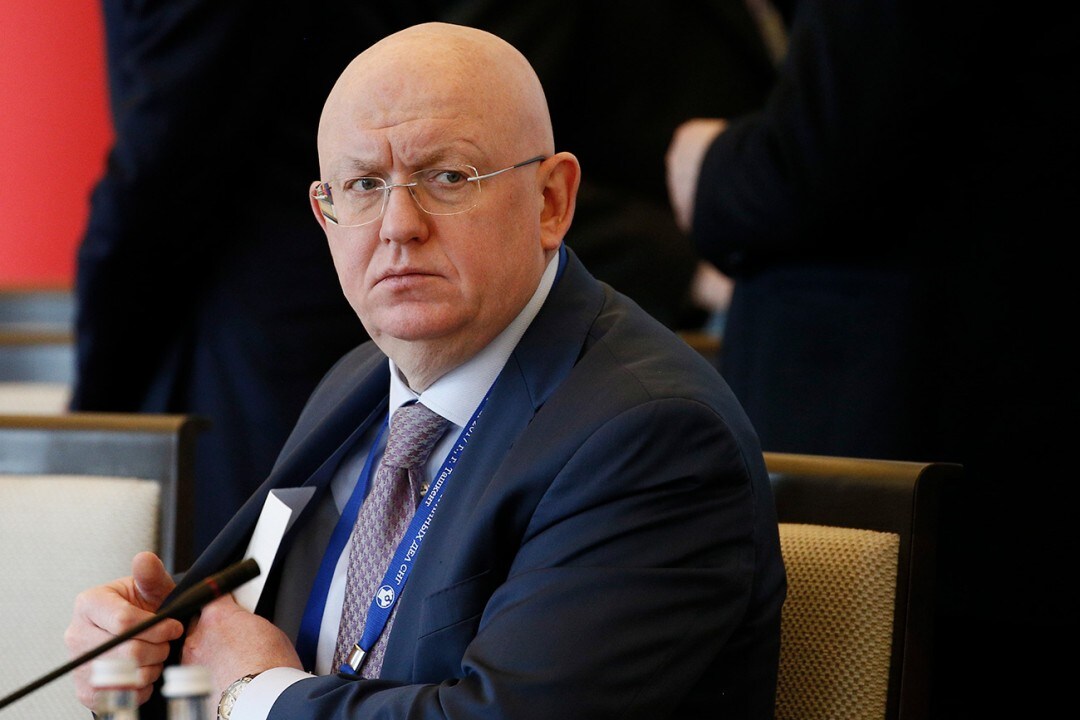
Russian ambassador to the UN Vasily Nebenzya (Source: Rbth.com)
Interviewed by Mezhdunarodnaya Zhizn (International Life) magazine, Russian Deputy Foreign Minister Sergey Ryabkov commented on the new round of U.S. sanctions against Russia:
"It is quite customary in our history and it is a typical method to derive pluses from minuses... We would like new generations who deal with the economy and business in our country to be inspired by such examples and we have implemented precisely this model of behavior."
(Tass.com, August 7, 2017)
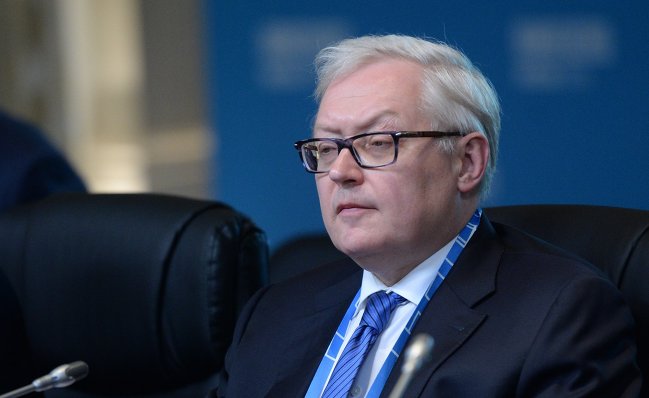
Russian Deputy Foreign Minister Sergey Ryabkov (Source: Vestnikkavkaza.net)
Zakharova Dixit
Russian Foreign Ministry spokesperson Maria Zakharova is one of the most-quoted Russian officials. She is known for using colorful language when describing Russian foreign policy in her weekly press briefings. The following are Zakharova's quotes of the week:

Zakharova posing in front of her dollhouse (Source: Facebook.com/maria.zakharova.167)
Zakharova accused former U.S. President Barack Obama of hypocrisy, after Obama's tweeted response to the far-right rally in Charlottesville, where a woman was killed, cited Nelson Mandela.
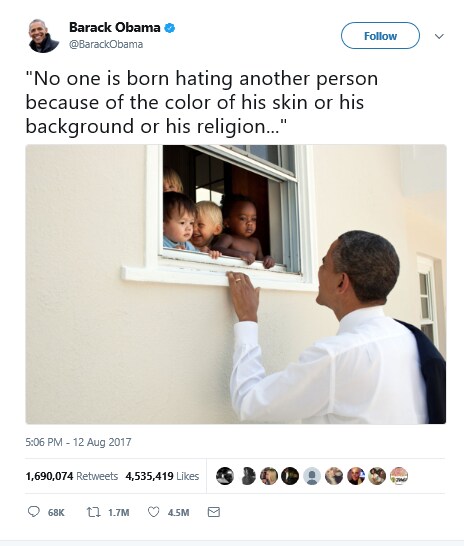
(Source: Twitter.com/BarackObama, August 12, 2017)
Zakharova reminded Obama in her Facebook page that he had chosen to intervene against a man who had enjoyed Mandela's esteem:
"Hypocrisy as it is:
After riots in Charlottesville, which arose on the basis of race, Obama wrote several tweets quoting Nelson Mandela on racism. The tweets became the most popular in this social network's history.
"That's a good start, though a belated one. Here is a list of Nelson Mandela's quotes about Muammar Qaddafi, which should definitely be published in Obama's twitter account– better late than never:
"1. 1997 - No country can claim to be the policeman of the world and no state can dictate to another what it should do. Those that yesterday were friends of our enemies have the gall today to tell me not to visit my brother Gaddafi. They are advising us to be ungrateful and forget our friends of the past.
"2. 1997 - It is our duty to give support to the brother leader...especially in regards to the sanctions which are not hitting just him, they are hitting the ordinary masses of the people ... our African brothers and sisters.
"3. 1999 - It was pure expediency to call on democratic South Africa to turn its back on Libya and Gaddafi, who had assisted us in obtaining democracy.
"4. 1997 - Those who say I should not be here (Tripoli) are without morals. I am not going to join them in their lack of morality.
"5. 1997 - This man helped us at a time when we were all alone.
"6. 1990 - Your readiness to provide us with the facilities of forming an army of liberation indicated your commitment to the fight for peace and human rights in the world.
"Mr. Obama, you directly participated in killing a man, whom Nelson Mandela called a brother and thanked for a help in obtaining democracy. A real democracy as opposed to the one invented in the Oval Office."
(Facebook.com/maria.zakharova.167, August 16, 2017)
In The News
Lavrov On U.S. Meddling In 2018 Elections: U.S. Diplomats Personally Attend Opposition Rallies... Our Diplomats In The U.S. Do Not Permit Themselves Such A Behavior
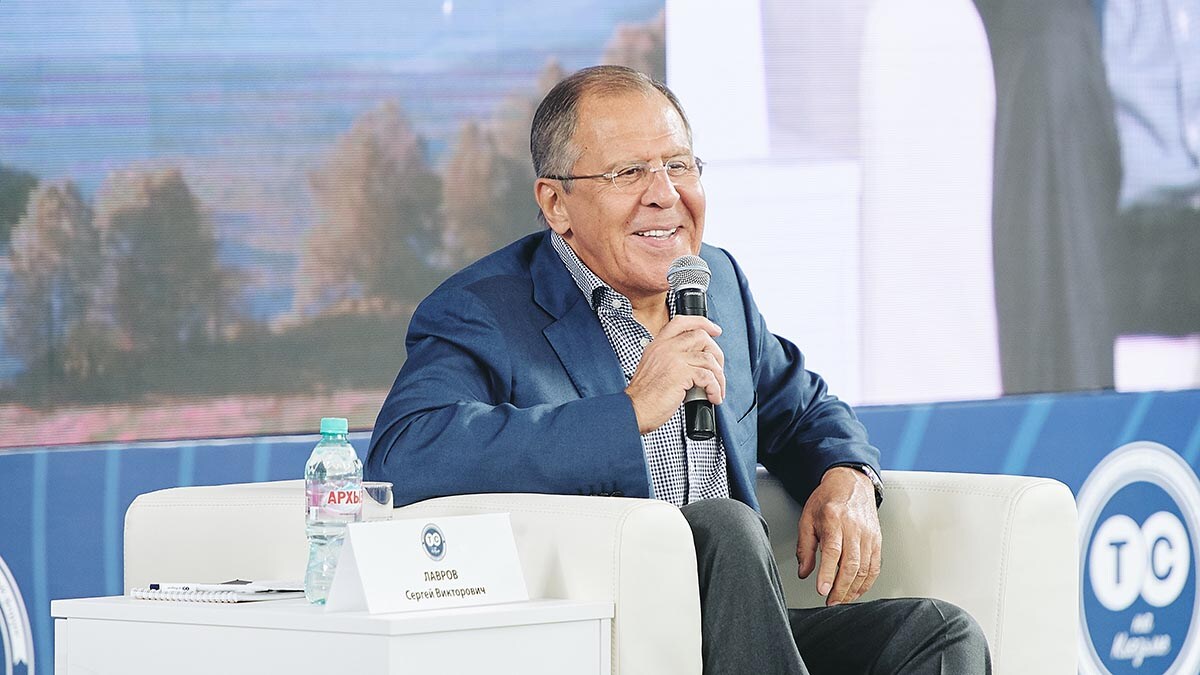
Lavrov at the Terra Scientia on Klyazma River National Educational Youth Forum (Source: Mid.ru, August 11, 2017)
On August 11, 2017, at the Terra Scientia on Klyazma River National Educational Youth Forum, Vladimir Region, Lavrov answered a question on U.S. interference in the 2018 presidential elections in Russia:
SUPPORT OUR WORK

Question: "I am a journalist from Sterlitamak. I have a very relevant question. Should we expect foreign interference in the 2018 presidential elections? What will Russia’s response be to this? Will some retaliatory measures be taken?"
Sergey Lavrov: "...President Vladimir Putin repeatedly said in his interviews, during the Direct Line, and later in his addresses and talks with his foreign counterparts that we saw how the U.S. Embassy and the U.S. consulates-general operated in Russia. They [U.S. diplomats] personally attend opposition rallies, they invite people and discuss something with them. Our diplomats in the United States and other countries do not permit themselves anything even closely resembling this [behavior].
"One example is the so-called Revolution of Dignity in Ukraine. Everyone knows that CIA officers were at work in the Ukrainian Security Service headquarters during the revolution and a year before it. It is not concealed. The U.S. ambassador to Ukraine summoned the opposition leaders to the Embassy and they conferred there...
"Back to your question about interference in elections: I do not know the U.S. Embassy’s plans, but there were many cases where U.S. diplomats were noticed committing unlawful acts. Of course, our relevant services should take appropriate measures. For example, very many Russian citizens are employed by the U.S. Embassy as local personnel. Under the Vienna Convention, if you hire personnel in a country where you have an embassy, this can only be technical personnel – a driver, typists, stenographers, etc. – and they have no right to engage in diplomatic work, including, naturally, its political aspects. But there are frequent cases, which we have recorded, of local employees of the U.S. Embassy travelling to various regions, conducting polls, and asking about people’s attitudes to this or that governor or the federal center in general. Under these circumstances, we only politely ask our U.S. colleagues to dismiss these people.
"I think this is part of the U.S. tradition, and they may not regard this as interference because, first, for them anything goes, and, second, this runs in their blood. Anywhere, in any country, be it Eastern or Central Europe, there are a lot of facts showing that the local U.S. embassy is literally in charge of processes, including actions by the opposition.
"I hope that after all these evidence-free accusations against us (because not a single hard fact has been presented for the 9 or 10 months that Washington has been harping on our interference in the U.S. elections), the acuteness of this topic itself will make the U.S. establishment, as they say, put on their thinking cap. If this happens here, we have our laws and the Vienna Convention on Diplomatic Relations, which says in very concrete terms what diplomatic representatives can or cannot do. We will be guided by the Convention and our laws."
(Mid.ru, August 11, 2017)
Russia In Syria
Foreign Minister Lavrov on ISIS and Jabhat Al-Nusra: The U.S.-led Coalition Is Not So Active With Regard To Jabhat al-Nusra, There Is A Suspicion That They Are Trying To Protect It
Talking at the Terra Scientia, Lavrov doubted the U.S.-led coalition's willingness to fight Jabhat Al-Nusra:
Question: "I have a question about Syria. We watch television and some doubts arise. Are our American comrades and the coalition they lead really fighting terrorism? Or are they only creating a semblance of that?
Sergey Lavrov: "... I have mixed feelings about the way the coalition is operating. We have already talked about that. I have no doubt that the coalition is committed to eradicating the so-called Islamic State. All of the coalition’s actions are designed to bleed this group dry, depriving it of support, fragmenting and liquidating it. In this regard, our goals completely coincide. By the way, Presidents Putin and Trump recently stated this when they met in Hamburg. We are in contact through our foreign policy agencies. Both sides believe these contacts are useful.
"As for Jabhat al-Nusra, it is a somewhat different kind of animal, as they say. This organization is opposed to the Islamic State but, just as ISIS, it is on the list of terrorist organizations that was approved by the UN Security Council. By all standards, as such, it is not simply a legitimate but a mandatory target for all those who are fighting the terrorist threat in Syria.
"There is ample evidence that certain outside players may be tacitly accepting and even encouraging the U.S. They are protecting Jabhat al-Nusra. At least, the U.S.-led coalition, which is carrying out active strikes against ISIS, is not so active with regard to Jabhat al-Nusra, if it conducts any serious operations against it in the first place. Not that I remember. There is a suspicion that they are trying to protect it in order to use it later as a battle worthy group in fighting against the Syrian government and bringing about regime change after ISIS is routed (nobody should have any doubts that this will happen although exactly when this will happen is hard to say right now; we are doing all we can to make it happen). I cannot say this with 100 percent certainty but to reiterate, there is substantial evidence that somebody is not averse to playing this card."
Zakharova: Western States Claim Commitment To Democracy, But They Supply Terrorists
Syrian Deputy Foreign Minister Faisal Mekdad stated at a press conference that chemical weapons from the U.K. and U.S. were found in areas liberated from terrorists. The chemical weapons were produced by the U.S. Federal Laboratories and NonLethal Technologies, as well as by UK’s Cherming Defence.
Russian MFA spokesperson Maria Zakharova commented: "The fact is that the western states and regional countries have directly or indirectly supplied banned poisonous substances to militants, terrorists and extremists active in Syria... [Western states] claim their commitment to democratic principles and international law but in fact, they supply militants with things necessary to continue military activities on the territory of an independent state."
(Tass.com, August 16, 2017)
Turkey' PM: Iran, Russia And Turkey Cooperate For Lasting Peace In Syria
On August 20, 2017, the Turkish Prime Minister Binali Yildirim said the following: Iran, Russia, and Turkey are cooperating to establish lasting peace in Syria. In regards to visits of senior Iranian and Russian military officials in Ankara, we are cooperating with each other to guarantee the ceasefire in Syria.
(Tasnimnews.com, Aug 21, 2017)
Korean Peninsula Crisis
Lavrov On N. Korea: 'We Cannot Support The Plan To Economically Suffocate N. Korea'
On August 16, during a joint press conference with Foreign Minister of Bolivia Fernando Huanacuni Mamani, Foreign Minister Sergey Lavrov answered to a media question on North Korea.
Question: "In a conversation yesterday [August 15, 2017] with your Chinese colleague, Wang Yi, you again noted that it would be unacceptable to use force to resolve the crisis on the Korean Peninsula and stressed Moscow's readiness to strengthen coordination with Beijing in the settlement process. Does this coordination imply certain economic steps, or is it just about diplomatic steps?"
Sergey Lavrov: "With regard to using our influence on Pyongyang in order to make it comply with the well-known UN Security Council resolutions, we are deeply convinced that the economic pressure has practically run its course. We cannot support the ideas that some of our partners continue to nurture, which literally seek to strangle North Korea economically with all the negative, tragic humanitarian ramifications for the people of the DPRK.
"We operate on the premise that all of the UN Security Council resolutions without exception, which have already introduced serious economic measures, contain the Security Council's obligations to continue supporting the process of returning to political talks and seeking a peaceful diplomatic settlement on the Korean Peninsula. All economic measures of influence imposed by the Security Council for several years have been implemented by the UN member states, and the UN Security Council's call and commitment to the parties concerned to pay attention to the political track has, in fact, been ignored. Russia and China believe that this is wrong, and even harmful and dangerous.
"So, we have come up with a joint initiative that includes the well-known 'double freeze' principle: North Korea will not test nuclear weapons and missiles, and the United States and the Republic of Korea will not conduct large-scale exercises in this region. I am aware of the US response to this 'double freeze' principle. They believe that legal cannot be exchanged for illegal. However, this is not about getting stuck in being right or thinking about certain falsely understood issues of prestige, but about the future of this region and hundreds of thousands of people who, according to experts, may be affected in case of hostilities, which Washington or Pyongyang never stop threatening. Recently, this rhetoric has somewhat subsided.
"Perhaps we should at least hope that the hotheads calm down a little. In conjunction with the People's Republic of China, we will push for compliance with the UN Security Council resolutions, which talk about the need to return to the political process. The UNSC economic measures have never been taken in isolation from the recognition of the need for a peaceful settlement. Our joint proposals with China are included in the joint statement of July 4, which deals exclusively with political and diplomatic steps."
(Mid.ru, August 16, 2017)
Russian Defense Analyst: Trump's Rhetoric Towards N. Korea Could Serve As A Cover For the So-Called Preventive Was Doctrine
Commenting on U.S. President Donald Trump's rhetoric towards North Korea, Sergei Yermakov, who chairs the Regional Security Department of the Defense Studies Center at the Russian Institute for Strategic Studies voiced alarm: "This bellicose rhetoric could serve as a cover for the so-called preventive war doctrine, which many have already forgotten... It is the same doctrine that George W. Bush widely used to launch the Iraq war for unclear reasons and sow chaos in the Middle East... If the United States continues to pursue this dangerous path, the same can happen in the Asia-Pacific region."
(Tass.com, August 11, 2017)
Tweeting on the Korean peninsula crisis, Senator Alexey Pushkov tweeted: "By Russia's logic, the smarter should be the first to pull back first. By America's logic – the weaker [side] should pull back first. At the moment neither Washington nor Pyongyang intends to pull back".
(Twitter.com/Alexey_Pushkov, August 11, 2017)
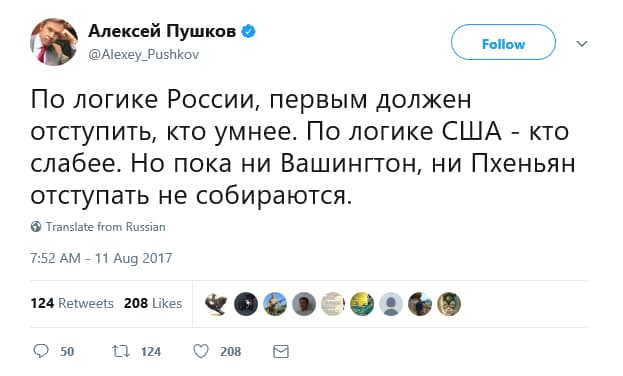
(Source: Twitter.com/Alexey_Pushkov, August 11, 2017)
Russia-Iran Relations
Lavrov On Iran's Nuclear Program And U.S. Sanctions: "The Missile Program Budget Is Basically Iran's Business'
Iran’s parliament passed the bill on additional $520 million for the Iranian ballistic missiles program and for the Islamic Revolutionary Guard, in response to the U.S. new sanctions against Iran.
The Federation Council’s International Affairs Committee Chair Konstantin Kosachev commented: "This is quite logical. This is what happens when one country - the U.S. - believes it may do anything, and others – nothing."
(Tass.com, August 13, 2017)
At the same joint conference with the Foreign Minister of Bolivia, Lavrov also expressed his opinion on Iran's missile program and U.S. sanctions against Tehran:
Question: "What can you say about Iranian President Hassan Rouhani's statement that Tehran may walk away from the nuclear program agreement if Washington continues to put Iran under pressure? What is Moscow's attitude to Iran's decision to increase its missile program budget?"
Sergey Lavrov:"The missile program budget is basically Iran's business. It is not prohibited from having this program. There are no legal bans in UN Security Council resolutions on this issue.
"As for Iranian President Hassan Rouhani's statement that Tehran may quit the Joint Comprehensive Plan of Action (JCPOA) that was concluded to resolve the situation around Iran's nuclear program, I hope this won't take place. I also hope the United States will not violate its JCPOA commitments, either.
As is known, in line with the periodic reviews mandated by US law, the United States has certified that Iran is meeting its commitments under the JCPOA. However, in parallel Washington has imposed new unilateral sanctions on Iran. It explained that these sanctions do not concern Iran's nuclear program or the JCPOA but reflect US discontent with Tehran's actions in other areas, including human rights and its conduct in the region. There may be only one response to this. Unilateral sanctions are unacceptable in principle and irresponsible if they are used to change in one's favor a well-calibrated balance (as is the case with the Iran nuclear deal) because they may upset this balance. One shouldn't resort to such provocations because the matter deals not even with national interests of a country but with an enormous region where we are interested in ensuring a nuclear-free status.
"Now I would like to make the second point in this context. We have suggested reaching an honest deal more than once – if a package of economic measures of influence on any country be it the DPRK or Iran is being agreed upon in the UN Security Council and a resolution is adopted, all parties should assume commitments to limit themselves to this negotiated package of sanctions and not to come up with unilateral restrictions so as to make up for what has not become part of the collective package. The Americans are vehemently opposed although it is hard to reject this principle. It will remain an urgent imperative. We will continue upholding it in all subsequent discussions and have already made corresponding statements at the UN Security Council consultations. This is a position of principle shared by many of our partners."
(Mid.ru, August 16, 2017)
Russia Requests Permission From U.S. To Sell Civilian Aircraft To Iran
Russian aircraft manufacturer Sukhoi requested a permission from the U.S. Treasury to deliver Sukhoi Superjet -100 civilian aircraft to Iran. The request was submitted to the Office of Foreign Assets Control. Iran is seeking to purchase at least 12 aircraft.
(Lenta.ru, August 10, 2017)
Russia–Macedonia–NATO Relations
On August 8, the Bloomberg news agency published an article quoting the Macedonian Defense Minister's, assertion that Russia was attempting to influence internal Macedonian politics in light of the country's aspiration to join NATO.
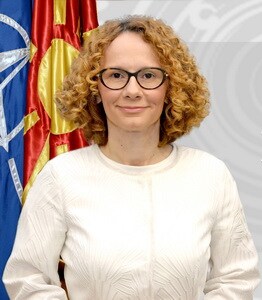
Macedonia's Minister of Defense Radmila Shekerinska (Source: Morm.gov.mk)
Russian MFA's spokesperson Maria Zakharova reacted to the accusations, in response to a media question:
Question: "What do you think about the provocative Bloomberg article accusing Russia of interfering in the internal affairs of the Republic of Macedonia?"
Maria Zakharova: "We took note of the material published by Bloomberg and widely cited by the Balkan media about Russia's alleged interference in the internal affairs of the Republic of Macedonia. Misleading references were made to an interview by the Defense Minister of that country, Radmila Sekerinska, the text of which Bloomberg chose not to make public. Given that Prime Minister of Serbia Ana Brnabic was the target of a similar provocation by this agency in July, we urge Bloomberg to publish the full text or audio/video recording of the interview by Radmila Sekerinska.
"To underscore, accusations that Russia interfered in the internal affairs of Macedonia are completely fabricated and based solely on unsubstantiated accusations on the part of Russophobes, as well as their false stories. We consider these insinuations as attempts by the enemies of Russia and Macedonia to complicate the traditionally friendly ties between our countries, to distract the attention of the Macedonian citizens from real threats to the sovereignty and territorial integrity of their country, including, among other things, the policy aimed at drawing Skopje into NATO at any cost, without regard for its core national interests.
"Given the reasonable doubts about Bloomberg's good faith, we are expecting to hear clarifications by the Macedonian side regarding the authenticity of the remarks ascribed to Ms. Shekerinska, which have not been disavowed and were even posted on the website of the Defense Ministry of Macedonia. Such statements are in stark contrast with the assurances of official Skopje about the desire of the Government of Macedonia to promote constructive and mutually beneficial relations with Russia, and to expand Russia-Macedonia cooperation."
(Mid.ru, August 15, 2017)




